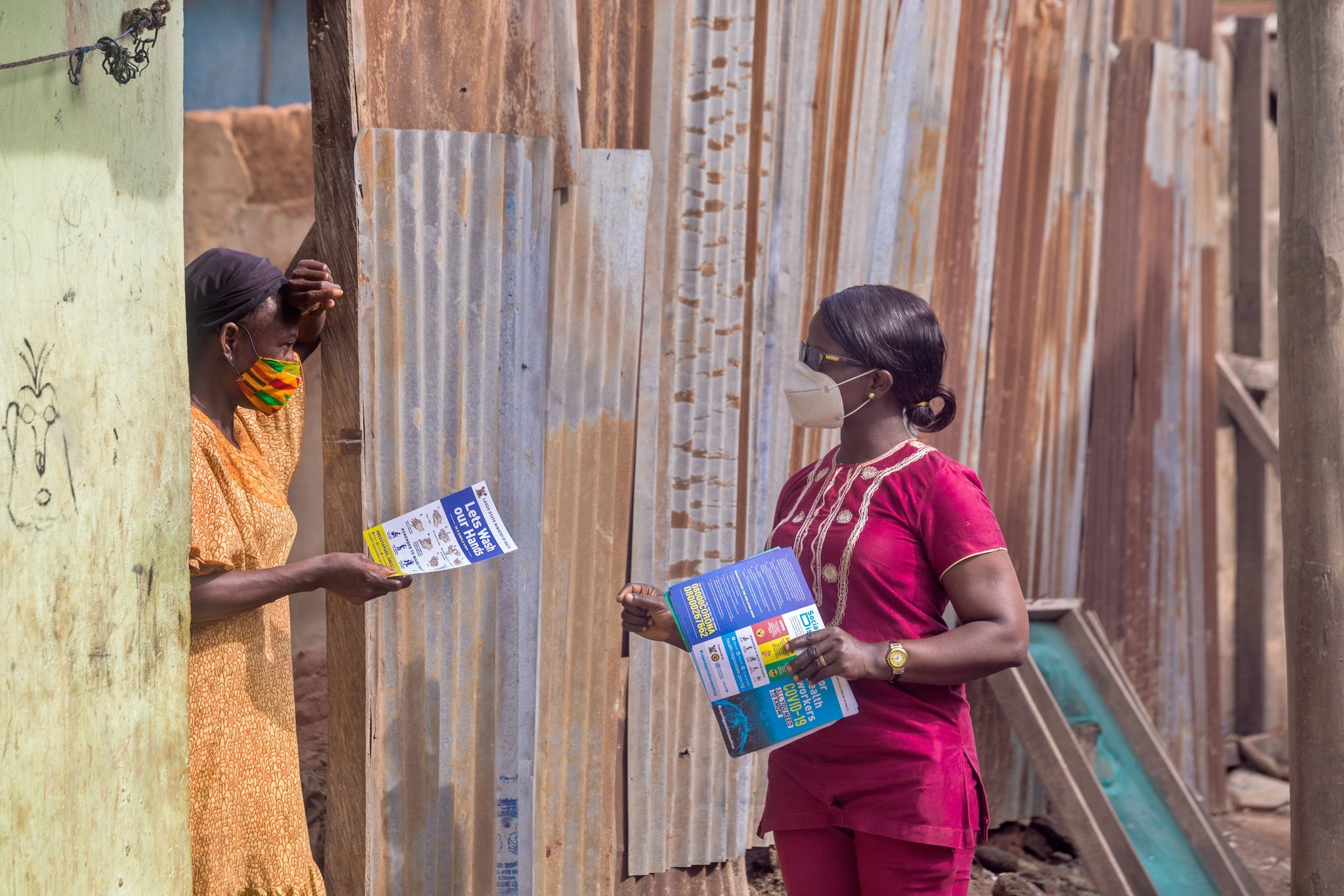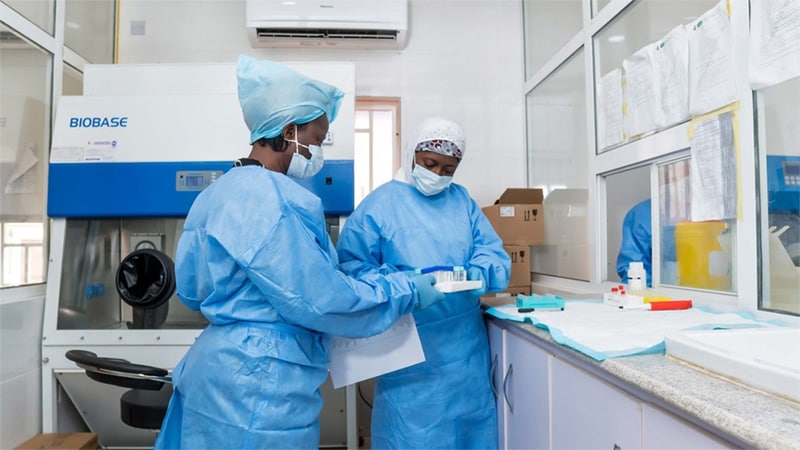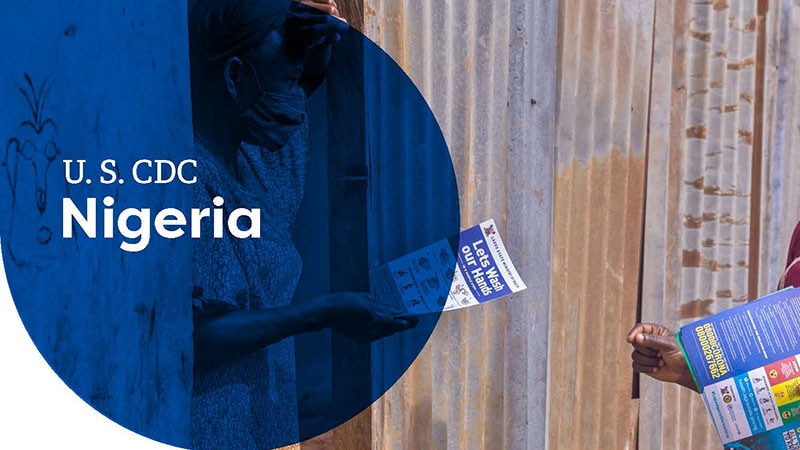At a glance
CDC works with the Government of Nigeria to protect and improve health through science, policy, partnership, and evidence-based action. CDC Nigeria supports the Global Health Security Agenda (GHSA), the U.S. President’s Emergency Plan for AIDS Relief (PEPFAR), the President’s Malaria Initiative (PMI), and immunization to help people live healthier, safer, and longer lives.

Overview

CDC established an office in Nigeria in 2001. CDC Nigeria works with the Federal Ministry of Health (FMOH), state ministries of health, government agencies, and partners to address:
- Global health security
- HIV
- Tuberculosis (TB)
- Malaria
- Vaccine-preventable diseases
Global health security

Strategic focus
In 2019, Nigeria became a GHSA partner country. CDC works with the Government of Nigeria and partners to achieve GHSA goals by strengthening surveillance, laboratory, workforce development, and emergency response.
Surveillance
CDC helped Nigeria enhance its national surveillance systems in response to COVID-19, mpox, and acute febrile illnesses. CDC supported the strengthening of surveillance at points of entry to prevent disease spread across borders.
Laboratory
CDC helped develop core laboratory diagnostic capacity to test for mpox, yellow fever, measles, Lassa fever, cholera, and cerebrospinal meningitis. These efforts helped strengthen Nigeria's ability to quickly detect and respond to outbreaks.
Workforce development
CDC helps train epidemiologists through the basic, intermediate, and advanced Field Epidemiology and Laboratory Training Programs. These epidemiologists work in relevant sectors of Nigeria's public health system, including outbreak responses.
Emergency Response
CDC supported the establishment of national and state-level Emergency Operations Centers and trains emergency response staff through the Public Health Emergency Management training program. CDC collaborates with national and state governments and partners to support responses to outbreaks of mpox, Lassa fever, diphtheria, and many other diseases.
Key achievements
With CDC's support:
- Nigeria's Joint External Evaluation score rose from 39% in 2017 to 54% in 2023.
- Nigeria developed a national Public Health Emergency Contingency Plan, as well as 16 plans for priority points of entry. These plans aid preparedness operations and enhance response coordination.
- Nigeria's Centre for Disease Control became a National Public Health Institute (NPHI).
- The NPHI integrates public health functions, coordinates across sectors, and accounts for public health resources.
- The NPHI integrates public health functions, coordinates across sectors, and accounts for public health resources.
HIV and TB
Strategic focus
As a key implementer of the PEPFAR, CDC works with the FMOH, state ministries of health, and partners to build sustainable and high-impact HIV programs. The objective is to achieve the UNAIDS 95-95-95 goals and end HIV as a public health threat by 2030.
Program focus areas include:
- Establishing integrated health service delivery platforms.
- Maintaining high quality care.
- Ensuring data availability for decision making.
- Closing treatment gaps in select states, key populations, adolescents, and children.
Key achievements
- At the end of 2023, about one million people were reported in the National Data Repository as receiving comprehensive HIV treatment services in CDC-supported states.
- CDC helped strengthen the healthcare workforce by establishing the National HIV Clinical Mentorship Program. As of January 2024, the program had 34 national and 315 state mentors.
- The establishment of the ECHO platform enhanced delivery of remote capacity building and technical support for HIV and TB, as well as immunization and health security.
- In 2023, CDC supported Nigeria in rolling out a life-saving shorter TB preventive treatment regimen known as "3HP", shortening the treatment period from six to three months.
New Molecular Laboratory
Malaria
Strategic focus
Nigeria has the most malaria cases in the world, with young children and pregnant women being the most affected groups. As a co-implementer of the U.S. President's Malaria Initiative (PMI), CDC works with national and international partners to prevent and control malaria in Nigeria. PMI prioritizes areas with the highest burden of malaria to achieve significant reduction in death and illness.
Key achievements
Since 2011, through PMI, CDC has helped provide:
- Nearly 83 million insecticide-treated bed nets.
- 22 million malaria preventive treatments in pregnancy.
- 164 million fast acting malaria medicines.
- Insecticide to spray 121,000 homes.
- Over 102 million rapid diagnostic tests for malaria.
Vaccine-preventable diseases
Strategic focus
CDC provides technical and programmatic expertise to eliminate or control vaccine-preventable diseases through immunizations. CDC works with international and local partners to strengthen immunization systems and expand routine vaccine delivery. This work helps prevent cases of infectious diseases such as polio and measles.
Key achievements
- CDC helped increased routine immunization coverage from 33% in 2016 to 57% in 2021. Unimmunized children decreased from 3.3 million in 2016-2017 to 2.2 million in 2022.
- CDC supported the introduction of the novel oral polio vaccine type 2 (nOPV2) in March 2021. By November 2022, more than 310 million children under five have been vaccinated.
- CDC supported the Government of Nigeria in introducing the HPV vaccine for girl ages 9-14. As of December 2023, more than 4.5 million girls had been vaccinated in 15 states with ongoing efforts to expand.
Infection Prevention and Control (IPC)
Strategic focus
CDC helped set up the national IPC program and training curriculum within the Nigeria Centre for Disease Control and Prevention. They supported the Surgical Site Infection Surveillance Pilot at tertiary health facilities and its current scale up. In addition, CDC supported the development and pilot of the national IPC monitoring and evaluation tool to provide actionable data to help reduce morbidity and mortality related to healthcare associated infections.
Key achievement
- In collaboration with the Nigeria Centre for Disease Control and Prevention, CDC helped establish the Orange Network, a group of 41 tertiary health facilities that will serve as models for IPC programs in the country.

